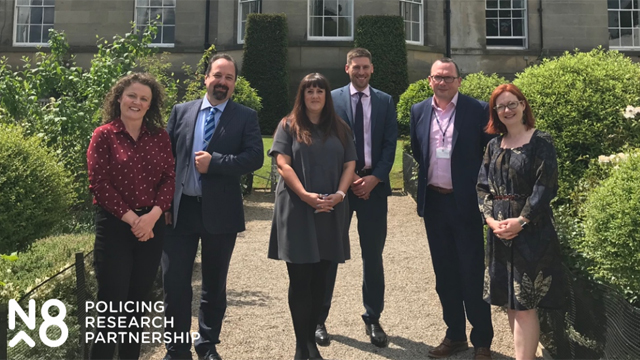
Knowledge Exchange Conference 2019 – Crime prevention and detection tech-tics: Responses from technology-enabled policing
In June 2019 the Knowledge Exchange Strand of the N8 Policing Research Partnership held a conference looking at the role of technology in relation to crime prevention and detection.
The role of technology now has a huge part to play within policing and goes way beyond cybercrime into day to day policing practice.
The day was opened by Nicole Westmarland, one of the N8 PRP Knowledge Exchange strand leads. We had a beautiful day for the conference in a lovely location (Middleton Lodge) in the heart of the North Yorkshire countryside.
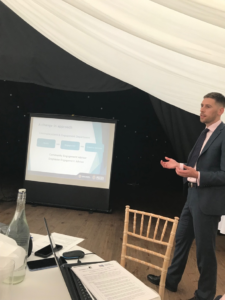 Neil Preston, Head of Communication and Engagement at Northumbria Police started off the day talking about ‘The evolution of communications and engagement within Northumbria Police’.
Neil Preston, Head of Communication and Engagement at Northumbria Police started off the day talking about ‘The evolution of communications and engagement within Northumbria Police’.
Neil started by explaining how their team completely restructured around two years ago. Within the new structure there was a big shift towards engagement with a new sub-team focused entirely on this. Having a reactive sub-team that focused exclusively on the ‘here and now’ meant that this stopped the urgent work from taking over the medium-long term needs of the force. Their in-house creative services are in demand to provide content for other regional public services.
Their social media is now a core part of their engagement work. Before the restructure they had a huge 72 corporate Northumbria police related twitter accounts – this is actual corporate official police accounts not individual officers. Now this number is much lower – there is one overarching twitter account and one for each local authority. Some of the content that was on some of the previous accounts was not deemed appropriate for an official policing account. This is especially important given their own research showed that police social media accounts are a highly trusted source of information by the general public – 97% of people in a survey (sorry no source) said they trusted police social media accounts – this was even higher than BBC news etc.
Neil then talked about one of their highly effective social media campaigns – ‘All We Want for Christmas is You.’ In this campaign 9 offenders were individually pictured and ‘invited to attend a police festive party’. These offenders had had a range of attempts already to find them, so social media was not the first but rather the end of the line in terms of attempts to find them. The campaign was really successful – within 12 days of the campaign 6 of the 9 had been located and arrested within 12 days. There was huge engagement with this campaign – one of the posts had over 8,000 comments and one had over half a million engagements with it. This is an example of a successful result and ties in with the ‘Be Bold and Brave’ ethos of their Department.
In another example that worked particularly effectively for them, a campaign around needing more BME police officers has resulted in a huge increase in the number of applications from BME candidates resulting in 21 new recruits starting.
Future plans include developing their use of virtual reality headsets, the use of chatbots, enhancing their use of live chat with specialists (such as when they did this with a CSI during a programme about forensics) and increase their ability to receive crime reports through social media.
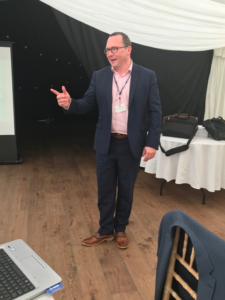 Next up was Dave Sampson, DC in the Digital Investigations and Intelligence Unit in Durham Constabulary. Dave showed a range of very hands on demonstrations on how open source website were able to be used in a range of ways both to commit and to detect crimes.
Next up was Dave Sampson, DC in the Digital Investigations and Intelligence Unit in Durham Constabulary. Dave showed a range of very hands on demonstrations on how open source website were able to be used in a range of ways both to commit and to detect crimes.
One of the organisers (Nicole Westmarland) was on edge as he interrogated her Facebook page to show how easy it was to work around even closed Facebook profiles through their friends who might not have the same level of security. Open source websites were shown that were able to find information about individuals both in terms of Facebook but also in terms of WhatsApp, twitter, etc. and demonstrations were given.
There was quite a discussion about the ethics of some of the data collection that was possible – ‘Just because I can do something should I?’ Dave mused. ‘Yes, as long as it is proportionate and the right level of authority is in place’ was his conclusion. The moral and ethical considerations are important, and this is more at the forefront now than it has been in previous years he argued.
Dave also emphasised the need of partnership working – particularly in relation to the private sector and academics. Future plans include a community portal where victims can drop evidence into a safe electronic location – for example a domestic abuse victim who has received 300 texts in one night and doesn’t want to call the control room to log each one individually or a group of witnesses who have video footage of a fight in a public place. Another (near) future plan is the development of a digital vault to share digital data more easily and securely between forces.
After a delicious lunch, Donna Marie Brown (Durham University, N8 PRP Knowledge Exchange co-lead) explained the opportunities that are available to people in terms of building partnerships as a potential outcome for the day and the N8PRP funding opportunities available.
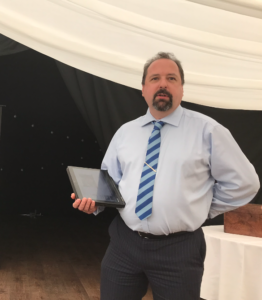 Justin Partridge (Humberside Police) then introduced the North East Transformation, Innovation and Collaboration (NETIC) project. Citing from the Home Office Modern Crime Prevention strategy of 2016, he highlighted that there is a real need to get ahead of the curve in terms of responses to new technologies: ‘The pace and scale of technological change is staggering’. Justin likened the topic to the way that metal theft started to be taken more seriously via a partnership approach and taking economics seriously.
Justin Partridge (Humberside Police) then introduced the North East Transformation, Innovation and Collaboration (NETIC) project. Citing from the Home Office Modern Crime Prevention strategy of 2016, he highlighted that there is a real need to get ahead of the curve in terms of responses to new technologies: ‘The pace and scale of technological change is staggering’. Justin likened the topic to the way that metal theft started to be taken more seriously via a partnership approach and taking economics seriously.
The example of where technology is able to take us was demonstrated using the example of a bridge that was 3D printed in China. Drone firework displays in a box soon in your local Lidl Justin mused, and your pizza deliveries might soon be delivered via Robot!
“In policing we need to understand where these new technologies might take us.” (Justin Partridge)
The first strand is around People – there is need for ‘cyber hygiene’ for all staff to keep themselves and their families safe. Basics such as knowing what a router is and how it could be used as evidence are important to know. At the other end, there needs to be better use of experts and cyber volunteers.
Technology is another strand – this involves new techniques and tools, working with cyber volunteers, academics, and developing a business resilience network.
There are some foundational issues underpinning this work – there is a need for more joined up procurement and there are some quite significant IT infrastructure issues. There is an important role for data analytics – we need better understanding of the data we already have and how we can use this to deliver a better service to the public.
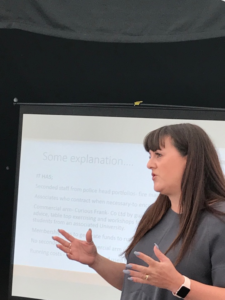 Next was Rebecca Chapman (South Yorkshire Police)
Next was Rebecca Chapman (South Yorkshire Police)
“This isn’t a cyber issue – its not even a digital problem – its a modern policing issue.” (Rebecca Chapman)
Rebecca explained that the NETIC project is about getting cops to think differently. In the past it was about looking for prints, then it was about CCTV, now it’s about was there a digital handshake of the offender’s phone with the router as they entered the house.
Future work is based around developing a North East Business Resilience Centre (NEBRC) based on the successful Scottish model. This will be a not for profit, private entity and start with a focus on cyber-crime but may expand further in time as the Scottish model has. The NEBRC will be a subscription model and the plan longer term is national coverage of Business Reliance Centres.
Millions of cyber related crimes are happening across our region, only a small proportion will report these to the police, and only a tiny proportion will see someone brought to justice for the offences. In addition to this, there is massive variation across the region in the service that victims will get. Only 38% of the public are confident that the police are well equipped to deal with cyber-crime incidents. Prevention is as important as pursuit for the Centre.
At the end of the day, the speakers returned to the floor accompanied by two policing academics (Mike Rowe and Martin Evison, both from Northumbria University) led a conversation reflecting on lessons learnt from the day, and where the remaining opportunities and challenges lay.
All in all, a fantastic day with wide ranging discussion and excellent puddings! The hallmarks of another N8 PRP first class conference!











0 Comments